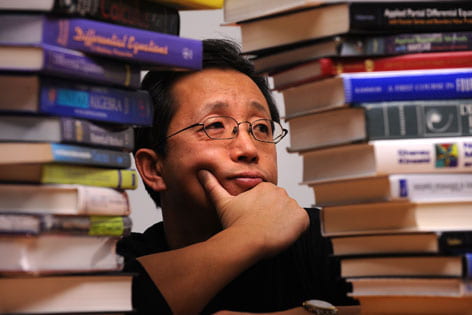Mathematics in the real world
Professor Hongkai Zhao uses mathematics to make computers run better, which in turn improves medical imaging and engineering design.

In modern science and technology, computing is as important as theory and experiment. Through clever use of mathematics, computers will continue to deliver better results and faster performance.
Professor Hongkai Zhao uses mathematics to make computers run better, which in turn improves medical imaging and engineering design. He will discuss his work during a Breakfast Lecture Series talk 7:30-9 a.m. Tuesday, Jan. 27, at the University Club. This event is sponsored by the School of Physical Sciences.
Below, Zhao shares how mathematics, paired with computers, can better our lives.
Q: What interests you about mathematics?
A: Mathematics is the most efficient and precise universal language. One mathematical equation may be worth more than 1,000 words when describing a complicated problem. Mathematics also provides a powerful tool to study and solve problems in science, engineering and everyday life. As an applied mathematician, I am not only fascinated by the elegance, rigor and abstractness of mathematics, I also am very interested in using it to solve real-world problems. With the help of modern computers and ever-growing computing power, mathematics will be more powerful.
Q: What real-world projects have you worked on using mathematics?
A: I have worked on developing mathematical methods and computational algorithms for imaging and image analysis, which enhances ultrasound imaging, optical imaging, image processing and computer visualization. I also have designed and analyzed efficient numerical algorithms for the simulation and better understanding of fluid flow (such as blood flow) and wave propagation (such as an earthquake) using computers.
Q: How do computers use mathematics to solve real-world problems?
A: A computer is a machine – no matter how powerful it is, it can work only with numbers and perform simple operations such as addition, subtraction, multiplication and division. First, a real-world problem has to be transformed into a mathematical problem. Then, a precise set of rules for solving the problem, or algorithm, has to be designed to instruct the computer to perform complicated tasks based on those simple operations.
Q: From the standpoint of mathematics, is there a limit to how fast and efficient computers will become?
A: Computer performance depends on hardware and software. Although the physical speed of a computer is limited by technology, it can become more powerful by using better and faster algorithms, for which mathematics definitely will help.
Q: What do you do in your spare time, when you are not crunching numbers?
A: I am a sports fan. I like playing many kinds of sports and watching games on TV.